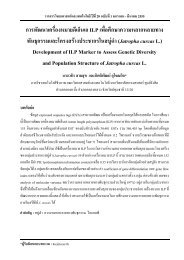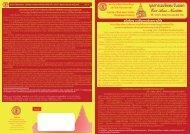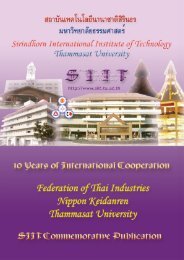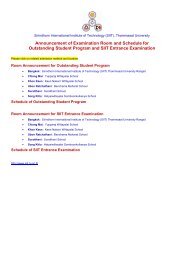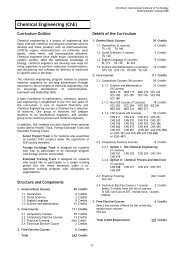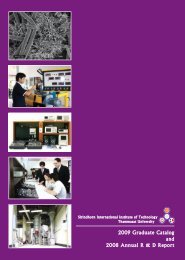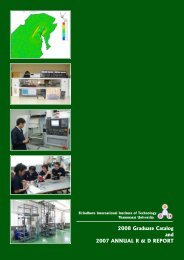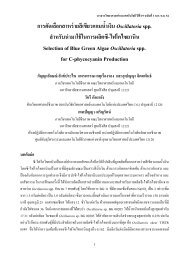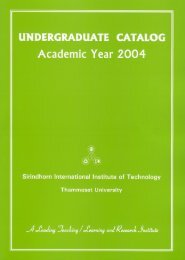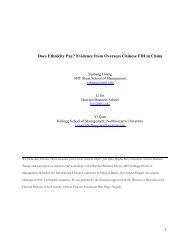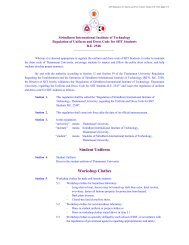2007 Graduate Catalog and 2006 Annual R & D Report - Sirindhorn ...
2007 Graduate Catalog and 2006 Annual R & D Report - Sirindhorn ...
2007 Graduate Catalog and 2006 Annual R & D Report - Sirindhorn ...
Create successful ePaper yourself
Turn your PDF publications into a flip-book with our unique Google optimized e-Paper software.
<strong>2007</strong> <strong>Graduate</strong> <strong>Catalog</strong> <strong>and</strong> <strong>2006</strong> <strong>Annual</strong> R & D <strong>Report</strong><br />
<strong>Sirindhorn</strong> International Institute of Technology (SIIT)<br />
Dr. Thananchai Leephakpreeda<br />
Associate Professor<br />
B.Eng. in Mechanical Engineering, Chulalongkorn University, Thail<strong>and</strong><br />
M.S. & Ph.D. in Mechanical Engineering, The University of Akron, Ohio, USA<br />
Areas of Specialization: Process control <strong>and</strong> modeling, Robotics, Expert control system, Neural networks<br />
<strong>and</strong> fuzzy logics, Process identification, Numerical simulation <strong>and</strong> optimization.<br />
Resarch Interest:<br />
Mechatronics in Application-oriented Control<br />
The primary research interests cover mechatronics in<br />
application-oriented control for practical implementation<br />
in process modeling <strong>and</strong> control as well as<br />
design <strong>and</strong> optimization. The current topics include<br />
optimal control for air condition, <strong>and</strong> novel techniques<br />
for computational intelligence in system <strong>and</strong> control<br />
engineering, etc.<br />
Dr. Vladimir I. Kuprianov<br />
Associate Professor<br />
Honors Diploma of Engineer (Equiv. to B.Eng. & M.Eng.) in Mechanical Engineering, Moscow Power<br />
Engineering Institute (MPEI), Russia<br />
D.Eng. in Steam Boilers & Steam Generators, MPEI, Russia<br />
Areas of Specialization: Thermal power plants; Boiler <strong>and</strong> furnace technology; Combustion <strong>and</strong> emission<br />
control in boilers fired with fossil fuels; Fluidized bed combustion (FBC) of biomass residues <strong>and</strong> wastes;<br />
Assessment of environmental impacts by thermal power plants <strong>and</strong> FBC systems.<br />
Research Interests:<br />
Analysis <strong>and</strong> Improvement of Thermal Efficiency<br />
<strong>and</strong> Environmental Performance of Boiler Units<br />
In many countries, fossil fuels of relatively low quality<br />
(e.g. lignite) <strong>and</strong>/or high-calorific fuels with elevated<br />
contents of fuel-S <strong>and</strong> fuel-N are used for power<br />
generation. Such a situation results in significant<br />
environmental impacts by the pollutants discharged<br />
from the boilers of different power plants.<br />
Implementation of least-cost methods for the<br />
improvement of thermal efficiency <strong>and</strong> environmental<br />
performance of operating utilities seems to be the<br />
most attractive way for energy conservation as well<br />
as mitigating environmental impacts by the power<br />
producers. Research works relevant to this objective<br />
include various aspects, such as: (1) exploring<br />
technological options for the improvement of the<br />
thermal efficiency <strong>and</strong> environmental performance of<br />
existing boiler units; (2) optimization of key operating<br />
variables affecting the combustion process in the<br />
boiler furnace when firing distinct fuels <strong>and</strong>/or fuel<br />
blends; (3) optimal load dispatching over the boiler<br />
units of a power plant. Additionally, through modeling<br />
the emission rates of different pollutants (NO x , CO 2 ,<br />
CO, SO x , PM, trace elements) discharged from<br />
distinct boiler units, reliable data for the assessment<br />
of environmental impacts by a power plant can be<br />
obtained for various fuel options taking into account<br />
actual unit operating conditions <strong>and</strong> power<br />
outputs.<br />
Development <strong>and</strong> Study of Fluidized Bed<br />
Combustion Systems for Firing Biomass Fuels<br />
Biomass is one of the major primary energy sources<br />
in Thail<strong>and</strong>. Residues <strong>and</strong> wastes collected on a large<br />
scale from agricultural <strong>and</strong> forest-related activities<br />
such as rice, sugar, wood <strong>and</strong> palm oil industries can<br />
be used (alternatively to fossil fuels) as energy<br />
sources for heat <strong>and</strong> power production in this country.<br />
Thus, the development of highly efficient, reliable <strong>and</strong><br />
environmentally friendly technologies for biomass<br />
utilization with the aim of energy production, is a<br />
problem of paramount importance for the Thai energy<br />
sector. Due to some advantages, fluidized bed<br />
combustion technology seems to be the most suitable<br />
for energy conversion of biomass. Conical fluidizedbed<br />
combustors of various modifications have been<br />
proposed <strong>and</strong> are being studied. The research<br />
objectives include: (1) investigation of fluidization<br />
characteristics of the bed material in conical<br />
prototypes; (2) study of the effects of fuel <strong>and</strong> bed<br />
material types as well as operating conditions<br />
(including air staging) on the combustion efficiency<br />
<strong>and</strong> emission characteristics of the combustor; (3)<br />
study of the physical <strong>and</strong> chemical factors affecting<br />
formation <strong>and</strong> reduction of major pollutants in the<br />
combustor; (4) optimization of the combustor design<br />
<strong>and</strong> its operating conditions; (5) assessment of<br />
environmental impacts for various biomass fuels; (6)<br />
study on co-firing of different biomass fuels <strong>and</strong>/or cofiring<br />
of biomass with coal in a conical fluidized bed.<br />
37




